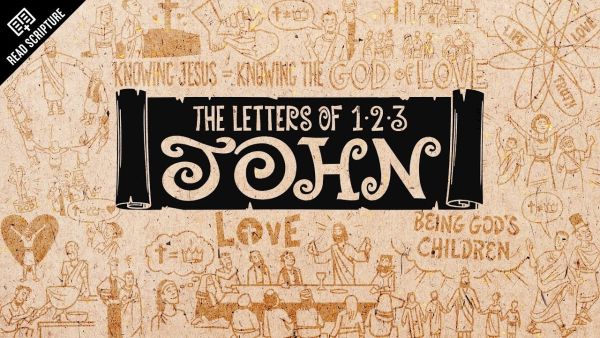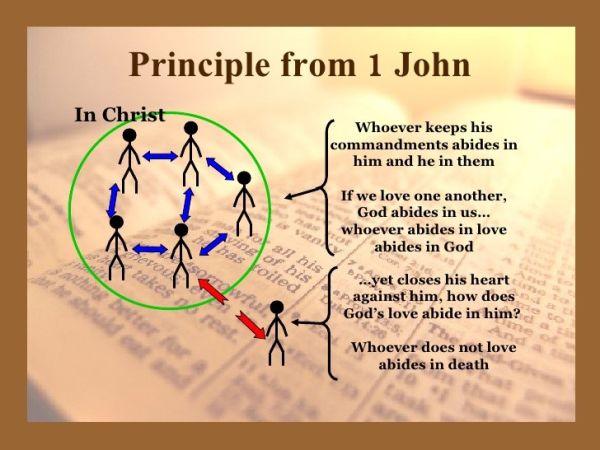Session 26 - 1, 2 and 3 John
Author
These letters have been accepted as having come from the Apostle John. That includes Polycarp (69-155), an early Christian leader who knew him personally. In addition, the writer includes himself as part of a group of eyewitnesses to the life and ministry of Jesus (1 John 1:3). By tradition, John spent the last phase of his life in and around Ephesus.
Date of Composition
The best evidence places the 3 letters around 90-95AD, the end of the age of the first apostles.

Purpose and Audience
1 John proclaims the good news about Jesus, saying, "so that you too may have fellowship with us; and indeed our fellowship is with the Father, and with His Son Jesus Christ" (1 John 1:3). Later, he adds, "so that you may not sin" (2:1) and "so that you may know that you have eternal life" (5:13); this is a message of assurance (cf 1 Jn 2:28; 4:17; 5:11-13), that no other religion offers. John knows that true fellowship with God and with God's people will not happen until the believers set aside their own desires in favour of the plans God has for them. John focuses on three issues: the zeal of the believers; standing firm against false teachers; and reassurance of eternal life. The churches may have been made up of Christians struggling with discouragement due to sin or false teachers in their midst. The letter is a shot in the arm.
John, the Elder of Ephesus, addresses his second short letter "to the chosen lady and her children," a phrase that has been much debated (2 John 1:1). It either refers to an actual woman or is a metaphor for a church. In either case, its application remains unchanged, making clear what our position should be regarding the enemies of God's truth.
John focuses on protecting our fellowship in Christ from those who teach falsehood. He warns his readers against inviting false teachers into their houses or even offering them greetings (2 John 1:10). Serious stuff, not the usual message of "love for everyone". John is keen on keeping the church free from heresy. Clearly, they are faithfully following the teachings of Christ. John sums up this kind of lifestyle in the exhortation to "love one another" (1:5), a clear reference to the great commandments of Jesus - to love God and love your neighbor (Matthew 22:36-40; John 13:34).
Those who walk in the truth should be people who love others. But they should be cautious whom and how they love. Deceivers and false teachers have infiltrated the church - people who teach false things about the person of Jesus, insisting that He was not truly a man but only appeared to be one. John warns the church to stay away from false teachers. His encouragement is to love others, but within the limits that truth allows.

3 John is written to Gaius, a leader of one or more churches in Asia Minor (in modern Turkey). John has received reports of difficulties caused by a man named Diotrephes, and John writes to reinforce for Gaius the proper way to deal with the issues. Troubles have come to the church.
In summary, Diotrephes (whose name literally means "nourished by Jupiter") has taken control of one of the churches there and used his power ("he loves to be first", v. 9) to ban certain travelling missionaries from coming to the church. At one point, they had seen leadership qualities in him and had placed him in charge, but now in the top spot, power has gone to his head. He is schismatic; he refuses to welcome travelling ministers of the Gospel. Upon receiving an earlier correction from John, Diotrephes refuses to listen even to him (3 John 1:9).
Beware of all petty gurus and self-promoting leaders.
This troubling situation prompts John to write to Gaius, commending the believers for holding fast to the truth and doing so with a loving attitude. They strive to make the Gospel a reality in their lives through the way they treat one another. In response to this good report, John encourages them to continue to love and support visiting Christians who give of themselves to minister in the churches of Asia.
Structure
John's three letters are largely concerned with the issue of fellowship (or non-fellowship) - with God, with one another, and enemies of the gospel.
In 1 John, there are clear lines between truth and error: Christ versus multiple antichrists; light versus darkness; truth versus falsehood; righteousness versus sin; love of the Father versus love of the world; love versus hate, secession and sectarianism; the Spirit of God versus the spirit of the Antichrist; and life versus death.
1 John: God is light (this teaching is a sequel to the Gospel of John), and we must walk in light. God is love, and we must walk in Him who loved us in Christ; through His amazing love He has made us His children (1 Jn 3:1). Our life is in Him. That (alone) is our solid assurance.
2 John: Love one another. Avoid false teachers; they do not have God. "See you soon."
3 John (the shortest book in the New Testament): Help visiting ministry; note poor leadership but imitate what is good. "Catch up with you soon."
There is a simple but profound dividing line that impacts every person:
"this is the testimony: God has given us eternal life, and this life is in his Son. Whoever has the Son has life; whoever does not have the Son of God does not have life" (1 Jn 5:12).
"Anyone who runs ahead and does not continue in the teaching of Christ does not have God; whoever continues in the teaching has both the Father and the Son (2 Jn 9).

Key Issues
Who is Jesus Christ?
Because there is not a complete New Testament that believers could refer to, many churches fall prey to pretenders who teach their own ideas and advance themselves as leaders. John writes this letter to set the record straight on some important issues, particularly concerning the identity of Jesus Christ.
John's readers are confronted with the error of Gnosticism, a form of dualism that existed at the time of Jesus but became a more serious problem in the second century. As a philosophy Gnosticism held that matter is evil and spirit is good. The solution to the tension between these two was knowledge, or gnosis, through which man rose from the mundane to the spiritual. In the gospel message, this led to two false theories concerning the person of Christ, Docetism—regarding the human Jesus as a ghost, thus denying the incarnation - and Cerinthianism (named after Cerenthius, who lived in and around Ephesus at the end of the 1st century) - making Jesus a dual personality, at times divine (as when the Holy Spirit descended on Him at His baptism) and at times human (during his crucifixion).
Gnosticism continues to exist, even in Canberra (http://www.gnososcanberra.org).
Beware of all bogus gods.

Life in Christ
If there is one message of hope that permeates John's writing, it is: eternal life. He starts and finishes his first epistle with it.
"That which was from the beginning, which we have heard, which we have seen with our eyes, which we have looked at and our hands have touched - this we proclaim concerning the Word of life. The life appeared; we have seen it and testify to it, and we proclaim to you the eternal life, which was with the Father and has appeared to us. We proclaim to you what we have seen and heard, so that you also may have fellowship with us. And our fellowship is with the Father and with his Son, Jesus Christ. We write this to make our joy complete." (1:1-4)
(Compare this with the Logos teaching in the Gospel of John Chapter 1.)
"I write these things to you who believe in the name of the Son of God so that you may know that you have eternal life. ... the Son of God has come and has given us understanding, so that we may know him who is true. And we are in him who is true by being in his Son Jesus Christ. He is the true God and eternal life. (5:13, 20)
There is another element to "That which was from the beginning". Theological deviations and cults often stem from people and movements claiming to be at the cutting edge with new revelations, insights, interpretations and truths. John's answer is: "nonsense ... go back to the beginning!" As we have seen above, when we understand and believe who Jesus is we have the basis of a unique relationship with God the father, with Jesus the Son and with one another (1 Jn 1:3). There is nothing in the world like this supernatural, special relationship between the true followers of Jesus Christ.
God & Love
John is often called the "Apostle of Love". The word "love" is used 33 times in 1 John alone. John recognises that love comes from God. If we have God's love we will love one another (1 John 4:7). This is the litmus test. While it is important to recognize the lines between truth and error, it must always be done in a spirit of love. Also, if we have God's love, this will be evident in keeping his commandments (2 Jn 6). Truth without love is dogmatism. Compliance with the Law without love is legalism.

How Temptation Works
"Do not love the world or anything in the world. If anyone loves the world, love for the Father is not in them. For everything in the world - the lust of the flesh, the lust of the eyes, and the pride of life - comes not from the Father but from the world. The world and its desires pass away, but whoever does the will of God lives forever." The following table illustrates how Adam and Eve were tempted (as was Jesus, with different results), based on 1 John 2:15-17:
| Subjects | Lust of the flesh * | Lust of the Eyes | Pride of Life | Key to Understanding |
|---|
| Eve | The fruit was good for food (Genesis 3:6) | The fruit was a delight to the eyes (Genesis 3:6) | Wisdom to be like God (Genesis 3:6, 22) | The event was "all about Adam and Eve" and their desires. |
| Jesus | Tempted to make stones into bread (Matthew 4:3) | Tempted by the glory of the world's kingdoms (Matthew 4:8) | Tempted to foolishly test God (Matthew 4:6-7) | This event was all about the integrity of Jesus and honouring God. |
* Cravings can be for valid things that are desired too much; or good things that are allowed to become supreme and replace God (such as money, sex, power/influence, food/physical appetite, fame/recognition, health/fitness, material goods/"affluenza").

We can overcome the world: "everyone born of God overcomes the world. This is the victory that has overcome the world, even our faith. Who is it that overcomes the world? Only the one who believes that Jesus is the Son of God" (1 Jn 5:4, 5).
Transformation
The Gospel is not abstract teaching; it is transformative. Individuals are changed by the power of Christ. They learn to love one another and obey the truth. God wants to conform us to the image of His Son. Being grounded as Christians only comes when we set aside sin in the pursuit of relationship with the one true God. "If we love one another, God lives in us, and His love is perfected in us" (1 John 4:12).
Spurious faith and false teachings do not provide assurance and do not have the power to transform lives.
According to John, if Christians love one another, that is evidence of God's presence in their lives. But if they bicker and fight all the time, or are selfish and do not look out for one another, they are showing that they do not know really God. That does not mean they will always be perfect. In fact, John also recognises that believing involves admitting our sins and seeking God's forgiveness. Depending on God for cleansing from guilt, along with admitting our wrongs against others and making amends, is part of knowing Him.
There are some Christians who believe in "sinless perfection", ie as Christians tey do not/cannot sin; if we sin it is evidence that we are not genuine Christians. However, read in context, 1 John 2 corrects this error. We should not sin, but if we do we have an advocate who pleads our case with the Father = Jesus. When Jesus appears, we will be like Him (1 Jn 3:2); that is a strong motive to a pure life (1 Jn 3:3)

Prayer
"This is the confidence we have in approaching God: that if we ask anything according to his will, he hears us. And if we know that he hears us - whatever we ask - we know that we have what we asked of him" (5:14, 15).
There is certainty here.
Hospitality
John writes to ensure a warm welcome from the churches to those who travel around preaching the gospel, offering them hospitality "in a manner that honours God" (3 John 6). How do you show hospitality to other Christians, particularly those who serve you and others in your local church and in churches elsewhere? Showing hospitality to others - particularly strangers - requires a level of trust, acceptance and sacrifice that is not necessarily demanded in our everyday lives. It forces us to rely on a common bond in Jesus Christ, rather than a blood relationships, acquaintances or shared experiences. It forces us out of our comfort zones and into a place where we must place our trust in God. We have a responsibility as Christians to live according to the truth we find in the life and ministry of Jesus, to care for and support those who serve God's people. Our Lord was surrounded by people who took care of Him. 3 John teaches us that we should do the same for those who carry on the teaching of Jesus in our own day.
For Reflection:
- Are you walking in God's light, God's life (as His children) and God's love (1 Jn 4:7-12, 16)?
- 1 John differentiates between happiness, which is temporary, and true joy. If we take the words written by John and we apply them to our daily lives, the true love, commitment, fellowship, and joy we long for will be ours.
- John describes love not as an emotion or feeling, nor even a declaration (1 Jn 3:18, 19), but obedience to the commandments of God. Jesus reiterated the importance of the commandments, especially the "first and greatest commandment," love for God (Deuteronomy 6:5), and the second, love for one another (Matthew 22:37-40; Leviticus 19:18). Far from abolishing the Old Testament law of God, Jesus came to fulfill it by providing the means of its fulfillment in Himself.
- Jesus came to destroy the works of the devil (1 Jn 3:8); what does that mean in your life?
- It is extremely important that we check everything we see, hear, and read that claims to be "Christian", by the Scriptures. The Holy Spirit will help us understand the truth (1 Jn 2:27; 3:24; 4:2, 4-6; 4:13). Otherwise, it is very easy to be taken in by new and exciting doctrines that appear to be based on Scripture but which, if examined closely, are departures from the Word of God. If they do not line up with Scripture, they are false, not of the Holy Spirit, and we should have nothing to do with them.
- Look for opportunities to show generous hospitality to those who are serving the Lord.
"keep away from anything that might take God's place in your hearts" (1 Jn 5:21, NLT).








